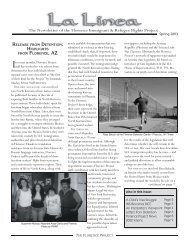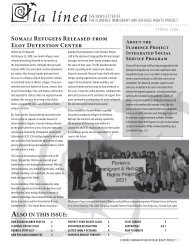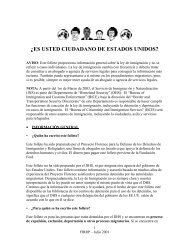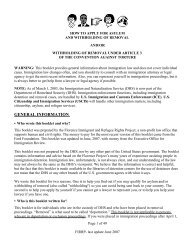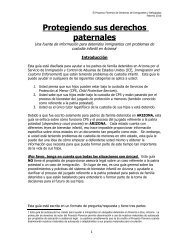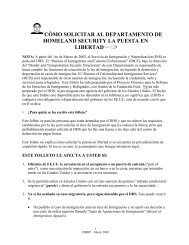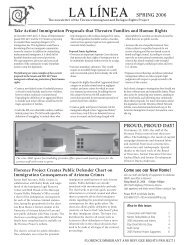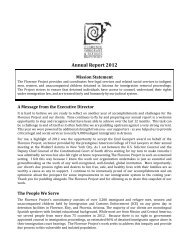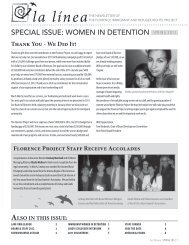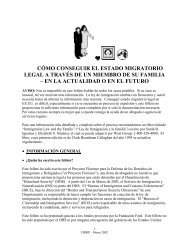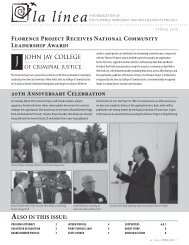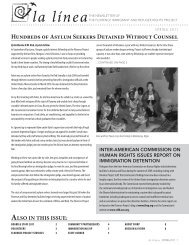quick reference chart and annotations for determining immigration ...
quick reference chart and annotations for determining immigration ...
quick reference chart and annotations for determining immigration ...
Create successful ePaper yourself
Turn your PDF publications into a flip-book with our unique Google optimized e-Paper software.
Immigrant Legal Resource Center, Florence Immigrant <strong>and</strong> Refugee Rights Project,<br />
Maricopa County Public Defender August 2012<br />
whether solicitation to possess a small amount of marijuana <strong>for</strong> sale would constitute a CMT. Although<br />
solicitation to possess <strong>for</strong> sale is still not removable as a controlled substance offense per Leyva-Licea v.<br />
INS, 187 F.3d 1147, 1150 (9th Cir. 1999), discussed below, defense counsel should assume that<br />
Solicitation to Possess <strong>for</strong> Sale will be found to be a CMT.<br />
Immigration counsel may also be able to argue that Barragan-Lopez only applies to CMTs that<br />
render an immigrant deportable under 8 USC § 1227, not CMTs that render an immigrant inadmissible<br />
under 8 USC § 1182. The BIA recently stated that “the Ninth Circuit has indicated that section<br />
[1227(a)(2)(A)] is broader in its coverage of crimes involving moral turpitude than section<br />
[1182(a)(2)(A)(i)(I)], because it would include inchoate offenses, such as solicitation <strong>and</strong> facilitation, that<br />
are not specifically enumerated in the inadmissibility statute, which lists only attempts <strong>and</strong> conspiracies.”<br />
Matter of Vo, 25 I&N Dec. 426, 429 n. 4 (BIA 2011). There<strong>for</strong>e, <strong>immigration</strong> counsel can argue that a<br />
conviction <strong>for</strong> Arizona solicitation to commit a CMT does not make a person inadmissible. Because this<br />
argument is not yet widely accepted, defense counsel should conservatively advise clients that most<br />
<strong>immigration</strong> judges <strong>and</strong> officials will find to the contrary.<br />
Because the potential sentence is less <strong>for</strong> solicitation than <strong>for</strong> the principal offense, a conviction<br />
may prevent the person from becoming deportable or inadmissible <strong>for</strong> a single CMT. Solicitation to<br />
commit a class 5 or 6 felony is a misdemeanor. See CMT discussion at 1. Attempt, supra <strong>and</strong> Note:<br />
CMT.<br />
Aggravated Felony: The Ninth Circuit held that solicitation under ARS § 13-1002 is not a drug<br />
trafficking aggravated felony, even if the principal offense is a drug trafficking offense. Leyva-Licea v.<br />
INS, 187 F.3d 1147, 1150 (9th Cir. 1999) (Arizona conviction <strong>for</strong> solicitation to possess marijuana <strong>for</strong><br />
sale is not an aggravated felony because the Controlled Substances Act does not specifically criminalize<br />
solicitation or contain any broad catch-all provision).<br />
Solicitation under ARS § 13-1002 should not be held to be an aggravated felony in non-drug<br />
cases as well, based on the fact that conspiracy <strong>and</strong> attempt are specifically included in the aggravated<br />
felony definition (see 8 USC § 1101(a)(43)(U)) while solicitation is not. For example, solicitation to<br />
commit a theft should be held not to constitute the aggravated felony “theft.” However, solicitation will<br />
still trigger an aggravated felony as a “crime of violence” since soliciting a violent act poses a substantial<br />
risk that physical <strong>for</strong>ce will be used against another even if the actual violence may occur after the<br />
solicitation itself. Prakash v. Holder, 579 F.3d 1033, 1036 (9th Cir. 2009); Matter of Guerrero, 25 I&N<br />
Dec. 631 (BIA 2011). There<strong>for</strong>e, counsel should assume that a plea to soliciting a “crime of violence”<br />
will itself be found a “crime of violence.”<br />
While the court in Prakash affirmed the holdings of Coronado-Durazo <strong>and</strong> Leyva-Licea that<br />
solicitation is not removable as a controlled substance offense or a drug trafficking aggravated felony, it is<br />
unclear whether the rationale in Prakash could be extended to other aggravated felonies. There is a<br />
strong argument that the inclusion of a “substantial risk” in the definition of a “crime of violence” found<br />
at 18 U.S.C. § 16(b) limits Prakash <strong>and</strong> Matter of Guerrero to crimes of violence. However, apart from<br />
drug crimes, defense counsel should be cautious when pleading to solicitation as a means to avoid an<br />
aggravated felony.<br />
Other grounds: Deportable <strong>and</strong> Inadmissible Drug Conviction. Regarding controlled<br />
substance convictions, the Ninth Circuit has held that solicitation under ARS § 13-1002 does not cause<br />
deportability under the controlled substance ground because (a) it is a generic offense unrelated to<br />
controlled substances <strong>and</strong> (b) attempt <strong>and</strong> conspiracy, but not solicitation, are included in the controlled<br />
Arizona Criminal Chart with Explanatory Endnote – August 2012<br />
13



